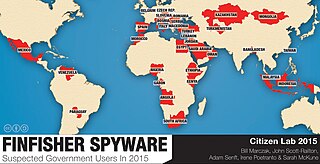Adware, often called advertising-supported software by its developers, is software that generates revenue for its developer by automatically generating online advertisements in the user interface of the software or on a screen presented to the user during the installation process. The software may generate two types of revenue: one is for the display of the advertisement and another on a "pay-per-click" basis, if the user clicks on the advertisement. Some advertisements also act as spyware, collecting and reporting data about the user, to be sold or used for targeted advertising or user profiling. The software may implement advertisements in a variety of ways, including a static box display, a banner display, a full screen, a video, a pop-up ad or in some other form. All forms of advertising carry health, ethical, privacy and security risks for users.
Spyware is any software with malicious behavior that aims to gather information about a person or organization and send it to another entity in a way that harms the user by violating their privacy, endangering their device's security, or other means. This behavior may be present in malware and in legitimate software. Websites may engage in spyware behaviors like web tracking. Hardware devices may also be affected.

This timeline of computer viruses and worms presents a chronological timeline of noteworthy computer viruses, computer worms, Trojan horses, similar malware, related research and events.
The compilation of a unified list of computer viruses is made difficult because of naming. To aid the fight against computer viruses and other types of malicious software, many security advisory organizations and developers of anti-virus software compile and publish lists of viruses. When a new virus appears, the rush begins to identify and understand it as well as develop appropriate counter-measures to stop its propagation. Along the way, a name is attached to the virus. As the developers of anti-virus software compete partly based on how quickly they react to the new threat, they usually study and name the viruses independently. By the time the virus is identified, many names denote the same virus.
Sanford 'Spamford' Wallace is an Internet spammer. He initially sent junk faxes before coming to notoriety in 1997, promoting himself as the original "Spam King". Wallace's prolific spamming has resulted in encounters with the United States government, anti-spam activists, and large corporations such as Facebook and MySpace.

BonziBuddy was a freeware desktop virtual assistant created by Joe and Jay Bonzi. Upon a user's choice, it would share jokes and facts, manage downloads, sing songs, and talk, among other functions, as it used Microsoft Agent.

Spybot – Search & Destroy (S&D) is a spyware and adware removal computer program compatible with Microsoft Windows. Dating back to the first Adwares in 2000, Spybot scans the computer hard disk and/or RAM for malicious software.
Norton AntiVirus is an anti-virus or anti-malware software product founded by Peter Norton, developed and distributed by Symantec since 1990 as part of its Norton family of computer security products. It uses signatures and heuristics to identify viruses. Other features included in it are e-mail spam filtering and phishing protection.

CA Anti-Spyware is a spyware detection program distributed by CA, Inc. Until 2007, it was known as PestPatrol.

Microsoft Defender Antivirus is an antivirus software component of Microsoft Windows. It was first released as a downloadable free anti-spyware program for Windows XP and was shipped with Windows Vista and Windows 7. It has evolved into a full antivirus program, replacing Microsoft Security Essentials in Windows 8 or later versions.
Norton Internet Security, developed by Symantec Corporation, is a discontinued computer program that provides malware protection and removal during a subscription period. It uses signatures and heuristics to identify viruses. Other features include a personal firewall, email spam filtering, and phishing protection. With the release of the 2015 line in summer 2014, Symantec officially retired Norton Internet Security after 14 years as the chief Norton product. It was superseded by Norton Security, a rechristened adaptation of the Norton 360 security suite.
Mobile malware is malicious software that targets mobile phones or wireless-enabled Personal digital assistants (PDA), by causing the collapse of the system and loss or leakage of confidential information. As wireless phones and PDA networks have become more and more common and have grown in complexity, it has become increasingly difficult to ensure their safety and security against electronic attacks in the form of viruses or other malware.

WinFixer was a family of scareware rogue security programs developed by Winsoftware which claimed to repair computer system problems on Microsoft Windows computers if a user purchased the full version of the software. The software was mainly installed without the user's consent. McAfee claimed that "the primary function of the free version appears to be to alarm the user into paying for registration, at least partially based on false or erroneous detections." The program prompted the user to purchase a paid copy of the program.

Zango,, formerly ePIPO, 180solutions and Hotbar, was a software company that provided users access to its partners' videos, games, tools and utilities in exchange for viewing targeted advertising placed on their computers. Zango software is listed as adware by Symantec, and is also labeled as a potentially unwanted program by McAfee. Zango was co-founded by two brothers: Keith Smith, who served as the CEO; and Ken Smith, who served as the CTO.
Rogue security software is a form of malicious software and internet fraud that misleads users into believing there is a virus on their computer and aims to convince them to pay for a fake malware removal tool that actually installs malware on their computer. It is a form of scareware that manipulates users through fear, and a form of ransomware. Rogue security software has been a serious security threat in desktop computing since 2008. An early example that gained infamy was SpySheriff and its clones, such as Nava Shield.

SpySheriff is malware that disguises itself as anti-spyware software. It attempts to mislead the user with false security alerts, threatening them into buying the program. Like other rogue antiviruses, after producing a list of false threats, it prompts the user to pay to remove them. The software is particularly difficult to remove, since it nests its components in System Restore folders, and also blocks some system management tools. However, SpySheriff can be removed by an experienced user, antivirus software, or by using a rescue disk.

FinFisher, also known as FinSpy, is surveillance software marketed by Lench IT Solutions plc, which markets the spyware through law enforcement channels.
HackingTeam was a Milan-based information technology company that sold offensive intrusion and surveillance capabilities to governments, law enforcement agencies and corporations. Its "Remote Control Systems" enable governments and corporations to monitor the communications of internet users, decipher their encrypted files and emails, record Skype and other Voice over IP communications, and remotely activate microphones and camera on target computers. The company has been criticized for providing these capabilities to governments with poor human rights records, though HackingTeam states that they have the ability to disable their software if it is used unethically. The Italian government has restricted their licence to do business with countries outside Europe.







